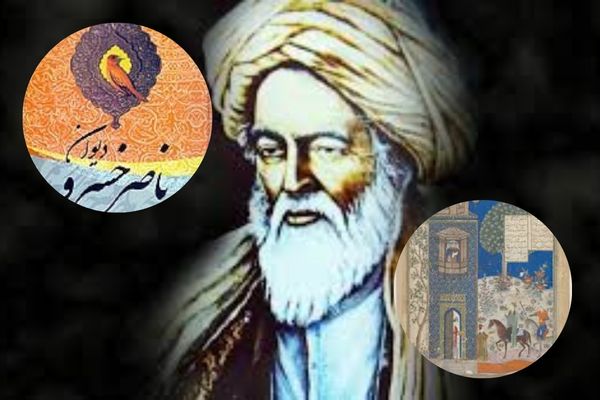Nasir Khosro (Abu Mo'in Hamid al-Din Nasir ibn Khusraw Qubadiyani) (1004 CE – c. 1077 CE) was a renowned Persian poet, philosopher, scholar, and Ismaili missionary. Born in Qubadiyan, a village near Balkh (present-day Tajikistan), Nasir Khosro remains one of the most significant figures in Persian literature and Islamic thought. His profound intellect and poetic mastery established him as a pioneer in ethical, religious, and philosophical writings.
Life and Early Career
Nasir Khosro was born into a wealthy Persian family during the Ghaznavid era. He received a comprehensive education in sciences, philosophy, theology, mathematics, and literature. Initially, he worked as an official in the court of the Ghaznavid and later the Seljuk empires, holding a prestigious administrative position. However, the worldly life of the court did not satisfy him, and a deep spiritual crisis prompted him to abandon his post and seek a path of greater meaning.
Transformation and Pilgrimage
In 1046 CE, Nasir Khosro experienced a spiritual awakening and embarked on a seven-year journey across the Islamic world, a period known as his safarnameh (book of travels). During this journey, he visited Mecca, Medina, Jerusalem, and Cairo, where he was profoundly influenced by the Fatimid Caliphate's Ismaili teachings. This pilgrimage transformed him into a devout Ismaili and fervent advocate of their philosophy.
Missionary Work and Exile
After returning to his homeland, Nasir Khosro dedicated his life to spreading Ismaili thought and ideals, which emphasized reason, philosophy, and spiritual enlightenment. However, his teachings were met with hostility by the Sunni majority, and he faced persecution. Forced into exile, he spent the remainder of his life in the remote mountainous region of Badakhshan (modern Tajikistan and Afghanistan), where he continued to write and teach.
Works and Contributions
Nasir Khosro’s literary and philosophical contributions are remarkable. His works, written in both Persian and Arabic, reflect a deep engagement with religion, ethics, philosophy, and science. Among his most significant writings are:
- Diwan (Collected Poems): A rich collection of Persian poetry that emphasizes morality, piety, and the pursuit of wisdom.
- Safarnameh: His famous travelogue, documenting his observations and reflections on the cultures, people, and cities he encountered during his travels.
- Gushayesh wa Rahayesh: A philosophical treatise exploring metaphysical and ethical questions.
- Jami' al-Hikmatayn (The Union of Two Wisdoms): A synthesis of religious and philosophical wisdom, blending Islamic teachings with Neoplatonic philosophy.
Legacy
Nasir Khosro's contributions to Persian literature and Islamic philosophy are celebrated to this day. His poetry reflects a unique blend of intellectual rigor and spiritual depth, inspiring generations of readers. In the Ismaili tradition, he is revered as a significant thinker and missionary. His work also influenced Persian poets like Rumi and Attar.
Modern scholars regard Nasir Khosro as a bridge between Persian literary traditions and Islamic philosophical discourse. His teachings continue to resonate in the fields of ethics, spirituality, and cultural understanding. His final resting place in Badakhshan has become a site of pilgrimage for admirers of his legacy.
Sokhanvar information
Published on Dec. 25, 2024, 3:15 p.m. by @admin
- Name: Nasir Khusraw
- Persian Name:: ناصرخسرو
- Alias: Poet
- Comments: 0
- Views: 907
Works
Zaad-al-Musafirin (or Travelling Provisions of Pilgrims)
Wajh-i Din (or The Face of Religion)
Book on Mathematics
Jamiʿ al hikmatayn
Books
- No books added yet.

